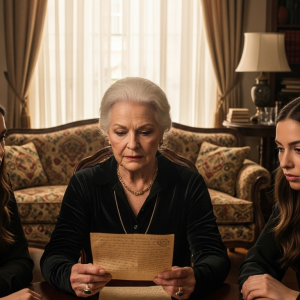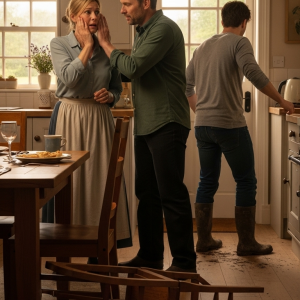I still remember how the air shifted in that house the day Owen and Haley moved in. It was a quiet that sneaked in slowly, like fog through a cracked window. For forty years, that house held everything I knew. My husband and I built it with sweat and laughter. Every dent in the kitchen counter had a story.
But once Haley arrived with her vision of “calm neutrality,” everything softened into something beige and unfamiliar. It started small. My old radio in the kitchen vanished, replaced by a speaker that followed voice commands. She called it “streamlining the soundscape.” I smiled, though I didn’t understand what was wrong with my weathered old dial.
Then my yellow floral curtains disappeared, the pattern deemed “too loud” for her open-concept design. I said nothing, telling myself this was the compromise families made. Then came the room reshuffle. Haley asked if I could move to the small back bedroom, as the main guest suite would be a better home office. She said it would be temporary. She always said things would be temporary.
My recliner was pushed into the garage, replaced by a chair with cold fabric and clean lines, built for someone who never intended to sit for long. A chair, I told myself, was just a chair. But one evening, Haley glanced at me and said to Owen that it was time I considered a space “more aligned with my energy.” The kitchen, she added, was starting to feel cluttered. Owen said nothing, his eyes fixed on the pitcher of iced tea as if it held all the answers.
That night, I sat in my new, smaller room, tracing the curling edges of the old wallpaper. I wasn’t just being included less; I was being erased. The next morning, I baked Owen’s favorite apple tart anyway. I wanted to believe that if I stayed gentle, things would return to normal. But Haley had hung a new sign in the kitchen. It read, “Less is more.” It didn’t feel like less. It felt like everything familiar was being replaced by her silence.
By the second month, Haley acted as if the house had always been hers. The pantry, which I had arranged the same way for decades, was the first real blow. One morning, I found it “optimized” with labeled glass jars and alphabetized spice racks. My system, my history, had been erased.
Her comments became more pointed, small barbs directed at no one in particular. The house smelled better with her diffuser. It was easier to concentrate without the noise from the TV. I was the one who watched the evening news. I was the noise.
She began creating rules, a printed list of “guidelines for shared spaces.” The kitchen must be cleaned immediately. No personal items in the living room. No strong scents. It was framed as a cooperative effort, but every item was a restriction placed on me. I took the paper, thanked her, and filed it away with expired coupons.
The worst moment came on a Sunday. I came inside from gardening and heard Haley’s voice from the kitchen. She was telling Owen she needed more space to feel “truly settled,” that my presence limited their sense of growth. Then she said something that froze my blood. “This no longer feels like our home. It feels like we’re guests in someone else’s memory.”
Owen didn’t correct her. He didn’t remind her whose name was on the deed. He just said he understood. I backed away, silent, and closed my bedroom door. Haley wasn’t just reshaping the house; she was reshaping the narrative, turning me into a shadow, a burden dressed as history. And Owen, my son, was letting it happen. That night, I started keeping my most important papers in a bag beside my bed.
It happened on a Thursday. I was walking back from the laundry room when I heard Haley on the phone, her voice clipped and tight. “We need to move things forward before she changes her mind,” she whispered. Then a pause. “No, she doesn’t know. She still thinks the account’s in her name.”
She turned the corner and saw me. For a second, she froze, then smiled, wide and artificial. “Do you need help with the towels?” she asked. I told her no. That afternoon, I checked my bank statements. One of the accounts had new routing numbers. I called the bank. The polite woman on the phone confirmed my fears. “I’m sorry,” she said, “but this account was closed last month. It’s been consolidated into a new trust. The name on file is Rollins Family Holding.”
I ended the call, the floor tilting beneath me. I didn’t join them for dinner. The next day, Haley asked me to stay with a friend for the weekend so she could host a brunch. It would be “less crowded,” she said. I told her I had plans.
Two hours later, I went out to trim the roses. When I came back, the door was locked. My key didn’t work. I rang the bell. No answer. I walked to the back; the sliding door was locked too. I stood there, staring at my own reflection in the glass, faint music drifting from inside.
Eventually, Owen opened the door. He looked tired. He said Haley had changed the locks. It wasn’t personal, he explained, they just needed space. “Just until things settle down,” he murmured, unable to meet my eyes. When I asked where I was supposed to go, he had no answer. I walked down the driveway and got in my car, my gardening gloves still in my hand. I had been erased in real time.
I ended up at a small motel on Route 6. The carpet smelled of old lemon cleaner, but the lock worked, and for the first time in months, I could hear myself breathe. That night, I didn’t sleep. I laid out every document I had and began to circle inconsistencies, dates, and signatures. Something was more than disrespectful. It was criminal.
That weekend, I called Trina, my old friend’s daughter, now a lawyer specializing in elder rights. She arrived with a canvas bag and a notepad. She listened to every detail, her expression unreadable. When I finished, she sat back. “This wasn’t a misunderstanding,” she said, her voice firm. “This was a plan.” I finally knew I wasn’t imagining it.
The next morning, Trina returned with two binders. The deed records from the county clerk’s office showed the house, co-owned by my husband and me, had been transferred into the “Rollins Family Holding” trust six weeks ago. The signature on the transfer was a shaky imitation of mine. I had never seen the document. The notary, Trina discovered, admitted Haley had brought it in, claiming I’d signed it privately. It was forged.
Next came the financial records. Quiet, meticulous transfers from my account to a new trust Owen had opened, each just under the reporting threshold. It was smart, deliberate, and it was theft. My own son, not just letting it happen, but orchestrating it.
Trina looked me in the eye. “If we move forward, things will get messy. Haley will turn the narrative into ammunition. She’ll say you’re confused, unstable.” I told her I no longer cared about their story. I only cared about the truth. That afternoon, we drafted a letter to the trust’s managing firm. It was the first domino.
While we waited for a response, I sorted through old boxes. I found a handwritten ledger from my husband, dated just before his final surgery. At the bottom, a note: “If anything happens to me, Cibil keeps the house. Non-negotiable.” It wasn’t a legal document, but it was his intention, his voice. I added it to Trina’s folder.
Three days later, Trina called at sunrise. The notary had provided a sworn statement confirming my absence during the signing. By noon, Trina had filed for an emergency injunction to block any further changes to the trust. It froze the damage and put Haley and Owen on notice.
That night, a short text came from Owen. We need to talk. Things have gone too far. No apology, just a request. I didn’t respond. The next day, Trina arrived with another folder. Surveillance footage from an ATM showed Owen withdrawing cash from the private trust account, the one he claimed Haley managed alone. It wasn’t just implication now. It was proof.
I stared at the grainy image of my son, hoodie up, eyes down. I couldn’t decide what hurt more: the lie, or how easy it had become for him. Trina placed a hand on the table. “We have enough,” she said. “Not just for the injunction to hold, but for the trust to be revoked.” This would be war, in paper and in public. I gave her a single, firm nod.
The courtroom was modest, filled with sharp morning light. Haley sat across the room, a picture of pressed blouses and a tight jaw. Owen arrived late, looking thinner, smaller. He never once looked at me.
Trina stood first, her voice controlled. She walked the judge through the facts like threads in a pattern, building the picture slowly, deliberately. The forged signature, the secret transfers, the notary’s statement, the ATM footage. She read aloud the line from my husband’s note. Haley’s lawyer called it “sentimental noise.” The judge allowed it.
When it was my turn, I rose without shaking. I told them I had spent my life building a home, a space of safety. I had given my time, my money, and my trust. And I had been erased. I didn’t raise my voice. I didn’t cry. I simply described what happened.
The judge listened, flipping through documents, his pen tapping. He didn’t make a final ruling, but he granted an extension of the injunction and ordered a forensic review of all signatures. It was a clear signal. He didn’t believe their story. Outside, Owen walked past me without a word. Haley glanced over her shoulder once, her eyes cold. The lie had lost its footing, and the truth was gaining ground.
In the ten days before the next hearing, the forensic expert confirmed it: the signature on the deed was a forgery. We had documented proof. Emotionally, everything was unraveling.
I received a typed, anonymous letter. This didn’t have to be public. You made your choice. Don’t expect sympathy. It was Haley’s voice, always posturing, always flipping blame. I dropped it in the trash.
Trina discovered that my husband’s estate attorney would submit a sworn affidavit, confirming my husband’s clear intent for me to retain sole ownership of the house. The picture for the court was becoming undeniable.
As we organized the files, Trina asked what I planned to do if we won. Keep the house? Sell it? For months, I just wanted to not be erased. Now, I wasn’t sure reclaiming the house meant reclaiming peace. The walls held too many echoes. The day before the final hearing, the judge issued an interim ruling: a complete freeze on all assets connected to the trust. It was a signal that their grip had slipped completely.
The night before the final court date, I sat with Trina. Haley and Owen had scrambled, filing motions suggesting I was mentally unfit. Trina said it plainly: “They’re cornered.” I walked into the courthouse not with dread, but with a strange calm.
Owen wasn’t there. He had sent a statement calling me “confused” and “too emotional.” Haley sat stiffly as her lawyer painted a picture of a loving family trying to protect a fragile matriarch. But they had no answer for the forgery. The judge asked Haley directly who signed the deed. Her lawyer objected. The judge overruled. “I assumed Owen handled it,” she stammered, her voice thin. It was the first time I had ever seen her unsure.
After a brief recess, the judge delivered his ruling. He declared the deed transfer invalid due to forgery. The trust was to be dissolved, the house returned to my sole ownership. He ordered a formal investigation into Owen’s withdrawals and issued a protective clause, requiring court approval for any future legal changes involving me. It wasn’t loud. It wasn’t dramatic. It was justice. Outside, I stepped into the sun and felt a weight I had carried for too long finally leave me.
I moved back into the house three days later. It didn’t feel like a victory. The air smelled of absence. Haley’s signature was everywhere—new knobs, new light fixtures. On the hallway shelf, a family portrait had been physically clipped to crop me out. A flower vase stood where my face used to be.
That first night, I slept in the guest room. The next morning, I found a shoebox on a bookshelf. Inside, among loan documents, was a recently updated life insurance policy listing Owen as the sole beneficiary. The amendment had been made within the last year. I called Trina and sent her the photos. I already knew what it meant.
Owen left a voicemail, a calm, rehearsed apology for “how things unfolded.” He said it was unfair to put the house above “family harmony.” I didn’t call back. That evening, I sat at my kitchen table and realized I didn’t need to stay. The victory wasn’t the walls. It was the fact that I had said no.
The next day, I met Trina at the courthouse. I revoked Owen’s power of attorney and placed the house and all related assets into a new trust. It would fund a foundation providing legal aid and housing for older women displaced from their homes. I didn’t want revenge. I wanted redefinition.
The dinner invitation came in a thick cream envelope: Let’s talk like family. I met them in a private room at a trendy downtown restaurant. The air smelled of tension and lemon vinaigrette. After strained pleasantries, Haley made her pitch. They were refinancing and it would be “cleaner” if I would agree to transfer the deed back to them. In exchange, they would “consider” adding me to an investment account.
I let the silence stretch. Then I smiled. “The house has already been placed in a trust,” I said, my voice even. “One you are not a part of.” I added that the investment account she mentioned was under legal review for funds improperly withdrawn. Owen’s face drained of color. Haley’s lips parted, but no sound came out.
I stood up. My part in this was over. As I left, I paused at the door. “Do not contact me again, unless it is through my lawyer’s office.” Then I walked out into the cool night air and let the door shut behind me.
A few days later, a letter from Owen arrived. He was sorry, he had gotten “swept up,” and he hoped we could talk. I met him at a diner we used to frequent. He looked smaller, tired. He admitted the house felt cold and wrong without me, that Haley had changed, that their life was all about logistics now.
He remembered a snowstorm when he was nine, when the power went out and we made cinnamon rolls by candlelight. A small, real smile touched his lips. It wasn’t an apology, not really, but it was a flicker of the boy I once knew.
I didn’t offer forgiveness. I didn’t plan on finding out if that flicker would grow or fade. The next day, I finalized the paperwork for the foundation. Trina called it a purposeful use of a legacy. I told her it wasn’t legacy. It was justice in a quieter form. The house smelled like memory that night as I baked those same cinnamon rolls, but this time, the warmth was all my own.
I moved into a small cottage overlooking a stretch of forest. The foundation was thriving, and already two women had been placed in transitional housing. One sent a note, thanking the organization for giving her a space with a locking door.
Haley tried to email me once, using the phrase “revisit arrangement.” I deleted it without a reply. Owen called, his voice rough, saying co-workers were praising my “admirable” strength, not realizing he was the son from the story. He said he finally understood why I didn’t come back.
The next spring, renovations began on an old motel the foundation had acquired. It would become a safe space for a dozen more women. I stood in the doorway of the tired building, but I didn’t see decay. I saw sanctuary. I had once feared being left out of a house. Now, I was building them. For a long time, I thought strength meant staying quiet. I learned that sometimes, real strength is walking away, and in doing so, I found my dignity. And from that, everything else followed.




